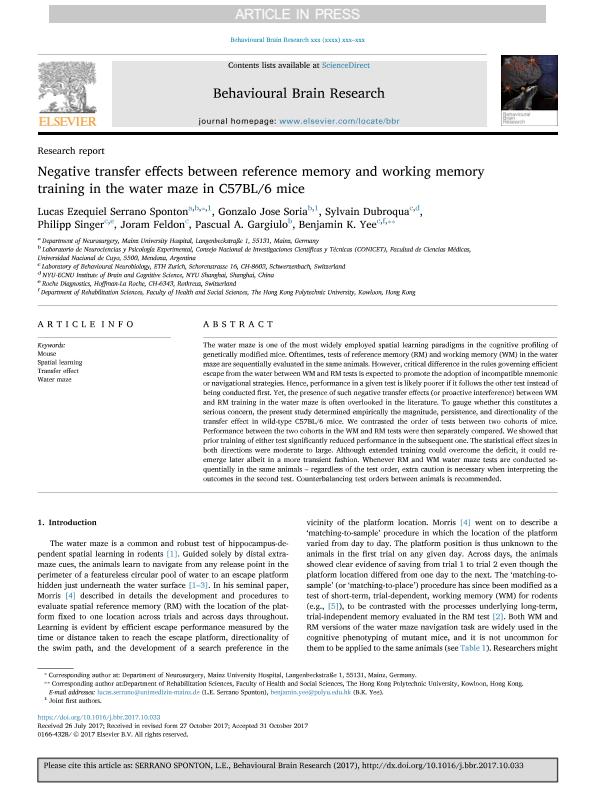Mostrar el registro sencillo del ítem
dc.contributor.author
Serrano Sponton, Lucas Ezequiel
dc.contributor.author
Soria, Gonzalo Jose
dc.contributor.author
Dubroqua, Sylvain
dc.contributor.author
Singer, Philipp
dc.contributor.author
Feldon, Joram

dc.contributor.author
Gargiulo, Pascual Angel

dc.contributor.author
Yee, Benjamin K.
dc.date.available
2018-04-24T20:28:55Z
dc.date.issued
2017-11
dc.identifier.citation
Serrano Sponton, Lucas Ezequiel; Soria, Gonzalo Jose; Dubroqua, Sylvain; Singer, Philipp; Feldon, Joram; et al.; Negative transfer effects between reference memory and working memory training in the water maze in C57BL/6 mice; Elsevier Science; Behavioural Brain Research; 339; 11-2017; 268-296
dc.identifier.issn
0166-4328
dc.identifier.uri
http://hdl.handle.net/11336/43365
dc.description.abstract
The water maze is one of the most widely employed spatial learning paradigms in the cognitive profiling of genetically modified mice. Oftentimes, tests of reference memory (RM) and working memory (WM) in the water maze are sequentially evaluated in the same animals. However, critical difference in the rules governing efficient escape from the water between WM and RM tests is expected to promote the adoption of incompatible mnemonic or navigational strategies. Hence, performance in a given test is likely poorer if it follows the other test instead of being conducted first. Yet, the presence of such negative transfer effects (or proactive interference) between WM and RM training in the water maze is often overlooked in the literature. To gauge whether this constitutes a serious concern, the present study determined empirically the magnitude, persistence, and directionality of the transfer effect in wild-type C57BL/6 mice. We contrasted the order of tests between two cohorts of mice. Performance between the two cohorts in the WM and RM tests were then separately compared. We showed that prior training of either test significantly reduced performance in the subsequent one. The statistical effect sizes in both directions were moderate to large. Although extended training could overcome the deficit, it could re-emerge later albeit in a more transient fashion. Whenever RM and WM water maze tests are conducted sequentially in the same animals – regardless of the test order, extra caution is necessary when interpreting the outcomes in the second test. Counterbalancing test orders between animals is recommended.
dc.format
application/pdf
dc.language.iso
eng
dc.publisher
Elsevier Science

dc.rights
info:eu-repo/semantics/openAccess
dc.rights.uri
https://creativecommons.org/licenses/by-nc-sa/2.5/ar/
dc.subject
Mouse
dc.subject
Spatial Learning
dc.subject
Transfer Effect
dc.subject
Water Maze
dc.subject.classification
Inmunología

dc.subject.classification
Medicina Básica

dc.subject.classification
CIENCIAS MÉDICAS Y DE LA SALUD

dc.title
Negative transfer effects between reference memory and working memory training in the water maze in C57BL/6 mice
dc.type
info:eu-repo/semantics/article
dc.type
info:ar-repo/semantics/artículo
dc.type
info:eu-repo/semantics/publishedVersion
dc.date.updated
2018-04-16T13:46:57Z
dc.journal.volume
339
dc.journal.pagination
268-296
dc.journal.pais
Países Bajos

dc.journal.ciudad
Amsterdam
dc.description.fil
Fil: Serrano Sponton, Lucas Ezequiel. Mainz University Hospital. Department of Neurosurger; Alemania. Universidad Nacional de Cuyo. Facultad de Ciencias Médicas; Argentina. Consejo Nacional de Investigaciones Científicas y Técnicas. Centro Científico Tecnológico Conicet - Mendoza; Argentina
dc.description.fil
Fil: Soria, Gonzalo Jose. Universidad Nacional de Cuyo. Facultad de Ciencias Médicas; Argentina. Consejo Nacional de Investigaciones Científicas y Técnicas. Centro Científico Tecnológico Conicet - Mendoza; Argentina
dc.description.fil
Fil: Dubroqua, Sylvain. Institute of Brain and Cognitive Science; China. Laboratory of Behavioural Neurobiology; Suiza
dc.description.fil
Fil: Singer, Philipp. Institute of Brain and Cognitive Science; China. Roche Diagnostics; Suiza
dc.description.fil
Fil: Feldon, Joram. Laboratory of Behavioural Neurobiology; Suiza. Roche Diagnostics; Suiza
dc.description.fil
Fil: Gargiulo, Pascual Angel. Universidad Nacional de cuyo. Facultad de Ciencias Médicas; Argentina. Consejo Nacional de Investigaciones Científicas y Técnicas. Centro Científico Tecnológico Conicet - Mendoza; Argentina
dc.description.fil
Fil: Yee, Benjamin K.. Laboratory of Behavioural Neurobiology; Suiza. The Hong Kong Polytechnic University. Faculty of Health and Social Sciences,; China
dc.journal.title
Behavioural Brain Research

dc.relation.alternativeid
info:eu-repo/semantics/altIdentifier/doi/http://dx.doi.org/10.1016/j.bbr.2017.10.033
dc.relation.alternativeid
info:eu-repo/semantics/altIdentifier/url/https://www.sciencedirect.com/science/article/pii/S0166432817312081
Archivos asociados
